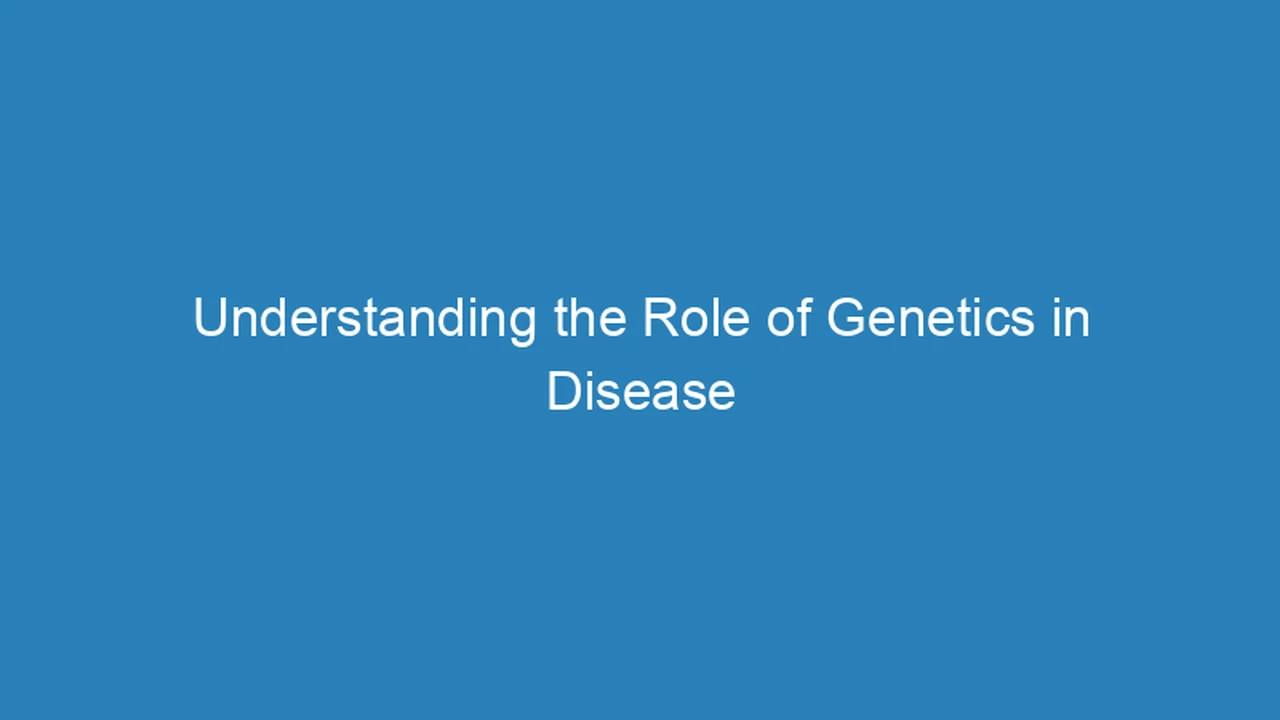The Role of Genetics in Disease Prevention
Sample meta description.

Understanding Your Genetic Predisposition: A Key to Proactive Health
Hey everyone! Ever wonder why some people seem to breeze through life, dodging every cold and flu, while others are constantly battling some ailment? A big part of the answer lies in our genes. We inherit a unique set of instructions from our parents, and these instructions play a huge role in determining our susceptibility to various diseases. Understanding your genetic predisposition isn't about fatalism; it's about empowerment. It's about knowing your vulnerabilities so you can take proactive steps to mitigate risks.
Genetics aren't destiny, though! Lifestyle choices, environmental factors, and even just plain luck all contribute to our overall health. But knowing your genetic blueprint can give you a significant head start in the game of disease prevention.
Genetic Testing Options: Decoding Your DNA for Better Health
So, how do you actually find out what your genes have to say? Well, that's where genetic testing comes in. There are several different types of tests available, each with its own strengths and limitations. Let's break down some of the most common options:
- Direct-to-Consumer (DTC) Genetic Tests: These are the tests you can order online and do at home. They typically involve spitting into a tube or swabbing your cheek and sending it off to a lab. DTC tests are generally more affordable and accessible than clinical genetic tests, but they also tend to be less comprehensive and may not provide as much detail about specific disease risks. Popular examples include 23andMe and AncestryDNA.
- Clinical Genetic Tests: These tests are ordered by a doctor and are usually performed in a clinical setting. They can be used to diagnose genetic disorders, assess risk for specific diseases, or guide treatment decisions. Clinical genetic tests are generally more accurate and comprehensive than DTC tests, but they also tend to be more expensive and require a doctor's referral.
- Pharmacogenomic Testing: This type of testing looks at how your genes affect your response to certain medications. It can help your doctor choose the right drug and dosage for you, minimizing side effects and maximizing effectiveness.
It's important to remember that genetic testing is not a magic bullet. The results should always be interpreted in the context of your overall health history, lifestyle, and family history. And it's always a good idea to talk to a doctor or genetic counselor before and after getting tested to understand the implications of the results.
Lifestyle Modifications Based on Genetic Insights: Tailoring Your Prevention Strategy
Okay, so you've gotten your genetic test results back. Now what? The real power lies in using that information to make informed lifestyle choices. Here are a few examples:
- If you have a genetic predisposition to heart disease: You might want to focus on eating a heart-healthy diet, getting regular exercise, and managing your cholesterol levels.
- If you have a genetic predisposition to type 2 diabetes: You might want to pay close attention to your blood sugar levels, maintain a healthy weight, and avoid sugary drinks.
- If you have a genetic predisposition to certain cancers: You might want to undergo more frequent screenings, such as mammograms or colonoscopies, and avoid known carcinogens.
The key is to use your genetic information to personalize your prevention strategy. Don't just blindly follow generic health advice. Instead, tailor your approach to your specific genetic vulnerabilities.
Nutritional Supplements for Targeted Disease Prevention: Boosting Your Genetic Defenses
Beyond lifestyle modifications, certain nutritional supplements can also play a role in bolstering your defenses against genetically-linked diseases. Here are a few examples, along with product recommendations:
- For Heart Health:
- Coenzyme Q10 (CoQ10): CoQ10 is an antioxidant that helps protect cells from damage and supports heart function. It may be particularly beneficial for individuals with a genetic predisposition to heart disease.
- Product Recommendation: Nature Made CoQ10 200mg Softgels.
- Usage Scenario: Take one softgel daily with a meal.
- Comparison: Compared to cheaper brands, Nature Made is USP verified, ensuring quality and potency.
- Price: Approximately $25 for a bottle of 60 softgels.
- Omega-3 Fatty Acids (Fish Oil): Omega-3s are essential fatty acids that have been shown to reduce inflammation, lower triglyceride levels, and improve heart health.
- Product Recommendation: Nordic Naturals Ultimate Omega.
- Usage Scenario: Take two softgels daily with a meal.
- Comparison: Nordic Naturals is known for its high-quality, purified fish oil with a pleasant lemon flavor. Cheaper options may have a fishy aftertaste.
- Price: Approximately $35 for a bottle of 120 softgels.
- Coenzyme Q10 (CoQ10): CoQ10 is an antioxidant that helps protect cells from damage and supports heart function. It may be particularly beneficial for individuals with a genetic predisposition to heart disease.
- For Diabetes Prevention:
- Chromium Picolinate: Chromium is a mineral that helps regulate blood sugar levels and improve insulin sensitivity.
- Product Recommendation: NOW Foods Chromium Picolinate 200mcg.
- Usage Scenario: Take one capsule daily with a meal.
- Comparison: NOW Foods is a reputable brand that offers a high-quality chromium picolinate supplement at an affordable price.
- Price: Approximately $10 for a bottle of 100 capsules.
- Berberine: Berberine is a natural compound that has been shown to improve blood sugar control and reduce insulin resistance.
- Product Recommendation: Thorne Research Berberine-500.
- Usage Scenario: Take one capsule twice daily with meals.
- Comparison: Thorne Research is known for its high-quality, well-researched supplements. Berberine can sometimes cause digestive upset, so start with a low dose and gradually increase as tolerated.
- Price: Approximately $40 for a bottle of 60 capsules.
- Chromium Picolinate: Chromium is a mineral that helps regulate blood sugar levels and improve insulin sensitivity.
- For Cancer Prevention:
- Vitamin D3: Vitamin D3 plays a crucial role in cell growth and immune function. Studies have linked vitamin D deficiency to an increased risk of certain cancers.
- Product Recommendation: Garden of Life Vitamin Code Raw Vitamin D3 5000 IU.
- Usage Scenario: Take one capsule daily with a meal.
- Comparison: Garden of Life offers a whole-food vitamin D3 supplement that is derived from lichen and is suitable for vegetarians and vegans.
- Price: Approximately $20 for a bottle of 60 capsules.
- Curcumin (from Turmeric): Curcumin is a powerful antioxidant and anti-inflammatory compound that has been shown to have anti-cancer properties.
- Product Recommendation: Doctor's Best High Absorption Curcumin with BioPerine.
- Usage Scenario: Take one capsule daily with a meal.
- Comparison: Doctor's Best uses BioPerine, a black pepper extract that enhances curcumin absorption.
- Price: Approximately $25 for a bottle of 120 capsules.
- Vitamin D3: Vitamin D3 plays a crucial role in cell growth and immune function. Studies have linked vitamin D deficiency to an increased risk of certain cancers.
Disclaimer: Always consult with your doctor before taking any new supplements, especially if you have any underlying health conditions or are taking any medications. Supplements are not intended to diagnose, treat, cure, or prevent any disease.
The Future of Genetic Disease Prevention: Personalized Medicine and Beyond
The field of genetic disease prevention is constantly evolving. As our understanding of the human genome deepens, we can expect to see even more personalized and effective prevention strategies emerge. Personalized medicine, which tailors treatment and prevention strategies to an individual's unique genetic makeup, is poised to revolutionize healthcare in the coming years.
Imagine a future where everyone has access to affordable genetic testing and receives personalized recommendations for diet, exercise, and supplementation based on their individual genetic profile. This is the promise of personalized medicine, and it's a future that's within our reach.
So, take control of your health, explore your genetic predispositions, and start building a personalized prevention plan today. Your genes may not be your destiny, but they can be a powerful tool for shaping a healthier future!
:max_bytes(150000):strip_icc()/277019-baked-pork-chops-with-cream-of-mushroom-soup-DDMFS-beauty-4x3-BG-7505-5762b731cf30447d9cbbbbbf387beafa.jpg)





